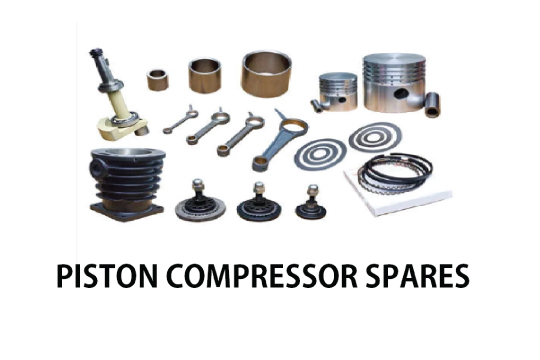-
Call
-
Whatsapp
9825014048
-
Location


Piston Compressor Spares
Piston Compressor Spares
High-capacity piston compressors from companies that rely on compressed air or gas are complex machines with many components working in unison. Familiarising yourself with piston compressor spares is essential to ensure safe and smooth operation. These resources are the unsung heroes, ready to step in when resources break down or malfunction. In this comprehensive guide, we will explore the world of piston and compressor spares, their importance, types, and maintenance, and their role in maintaining these vital machines' performance and reliability.
Piston compressors, also known as reciprocating compressors, are used in various industries, such as air tool operation, refrigeration, gas compression, etc. Piston compressor spares refer to replacement parts kept on hand to replace parts that wear or tear easily, reducing downtime and preventing production interruptions.
Need for Piston Compressor Spare:
- Reduced uptime: A piston compressor component failure can increase downtime. Having the correct spares readily available allows for faster repairs, minimizing the impact on productivity.
- Life Extension: Regular maintenance and use of spares when needed can significantly extend the life of a piston compressor. Replacing damaged components before they break down again prevents expensive repairs or replacements.
- Ensuring efficiency: Damaged or damaged components can reduce performance and increase energy consumption. The spare helps the compressor maintain its original operating level.
- Dealing with emergencies: In critical situations such as medical or industrial, compressor failure can create an emergency. Having spares on hand is essential to deal with situations like this.
Type of Piston Compressor Spare
Piston compressor spares include a wide range of products.
- Valve plates and reed valves: Valve plates and reed valves play an essential role in controlling the flow and entry of air or gases. These components are subject to damage and may need to be replaced.
- Gaskets and Seals: Gaskets and seals form an airtight seal in the compressor. Replacement may be necessary to prevent leaks.
- Pistons and piston rings: Pistons and piston rings are necessary for compression. Over time, piston rings can wear out, reducing the efficiency of compression.
- Bearings and bushings: Bearings and bushings help reduce friction and wear on compressor components. They may need to be replaced to keep them in good working order.
- Filters and air/oil separation: Filters and separators are necessary to maintain air quality and prevent oil degradation. Regular replacement improves efficiency.
Provision of Piston Compressor Spares
Proper maintenance of piston compressor spares includes the following:
- Regular inspection: Ensure all components are inspected for wear and tear. Whenever there is significant damage to parts, they should be replaced.
- Lubrication: Make sure all moving parts are adequately lubricated as recommended by the manufacturer
- Proper storage: Keep storage containers clean and dry to prevent contamination or deterioration.
- Record-Keeping: Maintain a record of spare part usage and replacement schedule to ensure timely repairs.
Piston compressor spares are the safety device that keeps jobs running smoothly. By understanding their importance and inventories and following proper maintenance practices, organisations can ensure their piston compressors' performance, reliability and longevity. With the right spares, the heartbeat of many businesses continues to pump uninterrupted, and compressed air in place is critical. and distributes gas.


FAQ

Frequently Ask Questions
Piston compressor spares refer to the various replacement parts and components necessary for the maintenance, repair, and upkeep of piston compressors. These spares may include items such as piston rings, gaskets, valves, bearings, seals, and other essential components required to ensure the efficient and reliable operation of the compressor.
Identifying the correct piston compressor spares involves determining the make, model, and specific configuration of your compressor. This information can typically be found in the compressor's manual or on the manufacturer's website. It's essential to match the spare parts precisely to your equipment to ensure proper fit, compatibility, and optimal performance.
Maintenance tasks that often require the use of piston compressor spares include routine inspections, lubrication, cleaning, and component replacement. Common maintenance procedures may involve replacing worn piston rings to maintain compression efficiency, installing new gaskets to prevent leaks, servicing valves and seals to ensure proper operation, and replacing bearings to address wear and tear. Regular maintenance with quality spares is crucial for prolonging the lifespan and reliability of piston compressors.

